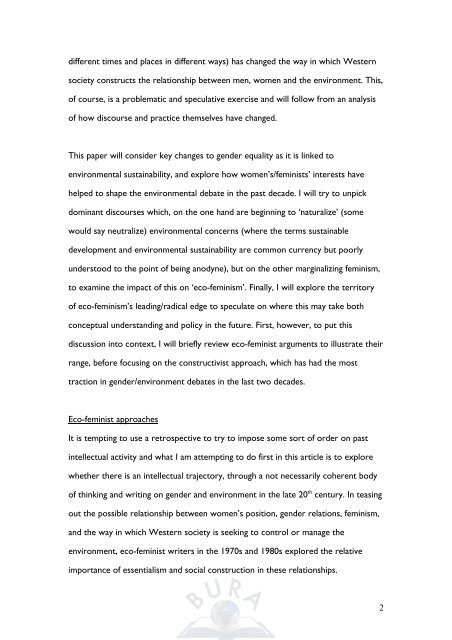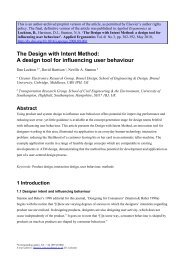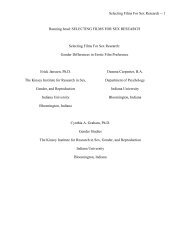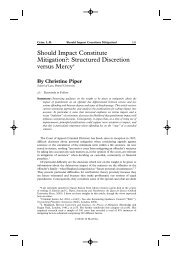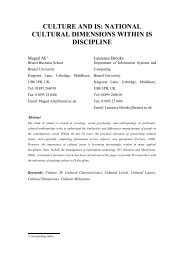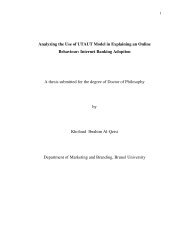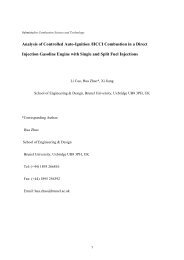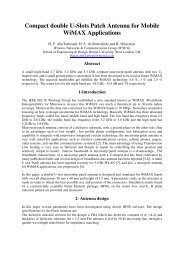Ecofeminism in the 21st Century
Ecofeminism in the 21st Century
Ecofeminism in the 21st Century
You also want an ePaper? Increase the reach of your titles
YUMPU automatically turns print PDFs into web optimized ePapers that Google loves.
different times and places <strong>in</strong> different ways) has changed <strong>the</strong> way <strong>in</strong> which Western<br />
society constructs <strong>the</strong> relationship between men, women and <strong>the</strong> environment. This,<br />
of course, is a problematic and speculative exercise and will follow from an analysis<br />
of how discourse and practice <strong>the</strong>mselves have changed.<br />
This paper will consider key changes to gender equality as it is l<strong>in</strong>ked to<br />
environmental susta<strong>in</strong>ability, and explore how women’s/fem<strong>in</strong>ists’ <strong>in</strong>terests have<br />
helped to shape <strong>the</strong> environmental debate <strong>in</strong> <strong>the</strong> past decade. I will try to unpick<br />
dom<strong>in</strong>ant discourses which, on <strong>the</strong> one hand are beg<strong>in</strong>n<strong>in</strong>g to ‘naturalize’ (some<br />
would say neutralize) environmental concerns (where <strong>the</strong> terms susta<strong>in</strong>able<br />
development and environmental susta<strong>in</strong>ability are common currency but poorly<br />
understood to <strong>the</strong> po<strong>in</strong>t of be<strong>in</strong>g anodyne), but on <strong>the</strong> o<strong>the</strong>r marg<strong>in</strong>aliz<strong>in</strong>g fem<strong>in</strong>ism,<br />
to exam<strong>in</strong>e <strong>the</strong> impact of this on ‘eco-fem<strong>in</strong>ism’. F<strong>in</strong>ally, I will explore <strong>the</strong> territory<br />
of eco-fem<strong>in</strong>ism’s lead<strong>in</strong>g/radical edge to speculate on where this may take both<br />
conceptual understand<strong>in</strong>g and policy <strong>in</strong> <strong>the</strong> future. First, however, to put this<br />
discussion <strong>in</strong>to context, I will briefly review eco-fem<strong>in</strong>ist arguments to illustrate <strong>the</strong>ir<br />
range, before focus<strong>in</strong>g on <strong>the</strong> constructivist approach, which has had <strong>the</strong> most<br />
traction <strong>in</strong> gender/environment debates <strong>in</strong> <strong>the</strong> last two decades.<br />
Eco-fem<strong>in</strong>ist approaches<br />
It is tempt<strong>in</strong>g to use a retrospective to try to impose some sort of order on past<br />
<strong>in</strong>tellectual activity and what I am attempt<strong>in</strong>g to do first <strong>in</strong> this article is to explore<br />
whe<strong>the</strong>r <strong>the</strong>re is an <strong>in</strong>tellectual trajectory, through a not necessarily coherent body<br />
of th<strong>in</strong>k<strong>in</strong>g and writ<strong>in</strong>g on gender and environment <strong>in</strong> <strong>the</strong> late 20 th century. In teas<strong>in</strong>g<br />
out <strong>the</strong> possible relationship between women’s position, gender relations, fem<strong>in</strong>ism,<br />
and <strong>the</strong> way <strong>in</strong> which Western society is seek<strong>in</strong>g to control or manage <strong>the</strong><br />
environment, eco-fem<strong>in</strong>ist writers <strong>in</strong> <strong>the</strong> 1970s and 1980s explored <strong>the</strong> relative<br />
importance of essentialism and social construction <strong>in</strong> <strong>the</strong>se relationships.<br />
2


